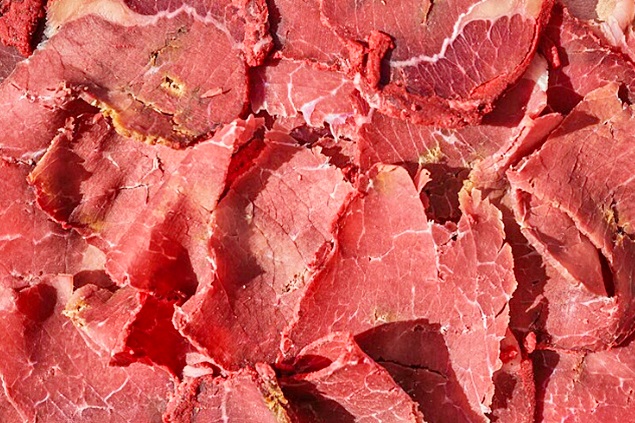1360

The world's first regulatory approval for cultivated beef has been granted in Israel. For stakeholders in cultivated meat, this green light is yet another sign that the EU, which has not yet approved such a product, lags behind? Or does it promise for the future? This is highlighted in an analysis published by FoodNavigator.
Celebration in Israel
In Israel, Aleph Farms is celebrating the fact that it has received regulatory approval from the Israeli Ministry of Health (MoH) in the form of a "No Questions" letter.
The cultivated meat product in question is the Petit Steak from Aleph Farms, which falls under the Aleph Cuts brand of the startup. The approval of cell-based meat and plant-based hybrid is not only a first for a non-poultry meat product, but also marks Israel's first green light for cultivated meat.
While it is a clear advantage for Israel's cultivated meat scene, stakeholders in Europe might be forgiven for feeling discouraged. The EU has not yet granted regulatory approval for a cultivated meat product, and FoodNavigator is not aware of any transmission to date (though at least one European cultivated meat player has filed a new food dossier abroad).
But according to stakeholders in Europe, the "No Questions" letter from the Ministry of Health provides hope. Cellular Agriculture Europe, a coalition of food companies producing cultivated meat, poultry, seafood, and ingredients, welcomes the development, with Secretary-General Caroline Rey describing this move as "another step towards the much-needed recognition of the role of cellular agriculture in diversifying proteins."
Stakeholders hope that approvals will "pave the way" for authorization in the EU
Cellular Agriculture Europe counts among its technology food members Aleph Farms, Bluu Seafood, Mosa Meat, and Meatable. Most FMCG Nestlé is an associate member.
The association was established at the end of 2021, a full year after Singapore obtained the world's first regulatory approval for a cultivated meat product (a chicken cultured ingredient from Eat Just-owned GOOD Meat). Cellular Agriculture Europe has since noted that GOOD Meat and UPSIDE Foods receive regulatory approval in the US for their cultivated chicken products.
The cultivated meat sector has since observed other regulatory developments in Europe but outside the EU. Last year, Aleph Farms applied for regulatory approval first in Switzerland and then in the UK.
At that time, policy manager for alternative proteins, and supporter of the Good Food Institute (GFI) Europe, Seth Roberts, said it was "fantastic" to see Switzerland leading the way for cultivated meat in Europe, but "surviving" the fact that it is the first ever cultivated meat request from Europe. the meat had rather landed in Switzerland than in Brussels.
Coherent strategy
"The EU needs to develop a coherent strategy to support the sustainable protein sector and ensure that regulatory processes are clear to reap the benefits of cultured meat."
Responding to the regulatory news of Aleph Farms in Israel, GFI Founder and President Bruce Friedrich said the announcement marks a "critical leap." "We are excited that consumers in Israel will soon, like those in the US and Singapore, be able to buy these delicious products."
The European Union, where cultivation was first invented, is not blatantly on its list. But EU cultivated meat players hope that the increasing number of regulatory approvals will only serve to increase the chances of green light at home.
"One of our association's goals is to support its members in future approval applications in the EU, and we hope that the proliferation of good news in Singapore, the US, and now Israel will pave the way for a smooth authorization process in Europe," said Cellular. Rey from Agriculture Europe told FoodNavigator.
How does Aleph Farms cultivate Petit Steak?
The first cultivated meat product, a burger, was developed in 2013 by Professor Mark Post of Maastricht University, the Netherlands. It wasn't until 2016 that the world's first cultivated meat company UPSIDE Foods was publicly launched, and the following year Aleph Farms was founded in Israel.
To make its cultivated meat products, Aleph Farms uses initial cells without GMOs and antibiotics from a single fertilized Black Angus cow egg and grows them into "real meat pieces" in a controlled laboratory setting. Apart from these initial cells, there are no animal-derived components in the cultivation process and the final product Petit Steak.
However, the product does not contain only cultivated meat. Petit Steak from Aleph Farms includes a matrix of plant proteins, which provide a supportive structure for the growth of Angus cells.
"Our matrix is porous, with a lot of surface area and space for oxygen, allowing cells to mimic muscle fiber formation. It also supports cell maturation and their ability to form tissue, contributing to the quality of the steak and texture."
Is there European appetite for cultivated meat?
While Cellular Agriculture Europe hopes that regulatory approvals will come down, not all in the EU feel the same. Last year, Italy adopted a bill banning the production and commercialization of cultured meat, and France is now considering similar restrictions.
Earlier this week, during the debate of the Council Committee for Agriculture and Fisheries (AgriFish), delegations from Austria, France, and Italy proposed that market authorization decisions in the EU be suspended until questions regarding ethics, economy, sustainability, social society, public health, and transparency are answered. of cultivated meat.
Delegations also wondered whether the current regulation on new foods provides a "adequate and comprehensive" framework for evaluating potential risks associated with these products.
However, other representatives at the AgriFish meeting did not share these views, with Dutch and Danish participants, for example, defending the merits of cultivated meat, suggesting that there is a certain appetite for cultivated meat across the block of member states. (Photo: Freepik)





